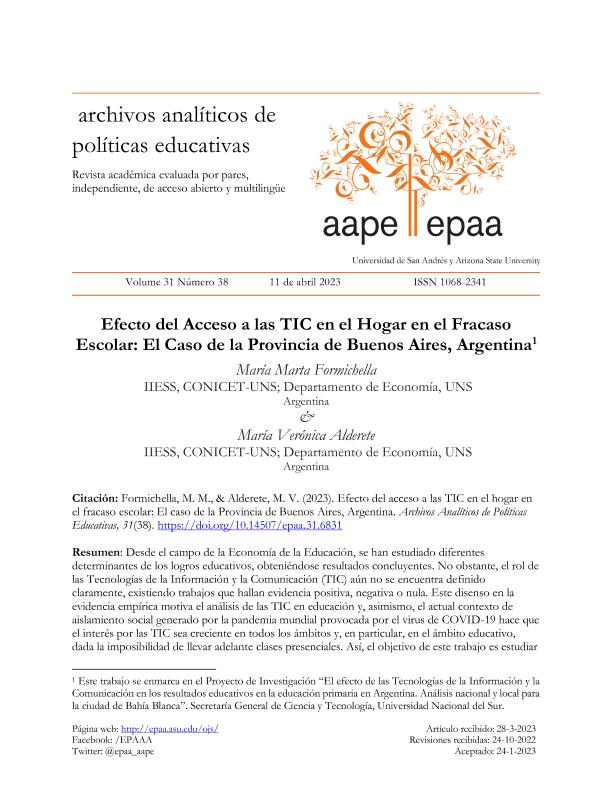Mostrar el registro sencillo del ítem
dc.contributor.author
Formichella, Maria Marta

dc.contributor.author
Alderete, Maria Veronica

dc.date.available
2023-12-26T15:39:52Z
dc.date.issued
2023-04-11
dc.identifier.citation
Formichella, Maria Marta; Alderete, Maria Veronica; Efecto del Acceso a las TIC en el Hogar en el Fracaso Escolar: El Caso de la Provincia de Buenos Aires, Argentina; Arizona State University; Education Policy Analysis Archives; 31; 11-4-2023; 1-27
dc.identifier.issn
1068-2341
dc.identifier.uri
http://hdl.handle.net/11336/221431
dc.description.abstract
Desde el campo de la Economía de la Educación, se han estudiado diferentes determinantes de los logros educativos, obteniéndose resultados concluyentes. No obstante, el rol de las Tecnologías de la Información y la Comunicación (TIC) aún no se encuentra definido claramente, existiendo trabajos que hallan evidencia positiva, negativa o nula. Este disenso en la evidencia empírica motiva el análisis de las TIC en educación y, asimismo, el actual contexto de aislamiento social generado por la pandemia mundial provocada por el virus de COVID-19 hace que el interés por las TIC sea creciente en todos los ámbitos y, en particular, en el ámbito educativo, dada la imposibilidad de llevar adelante clases presenciales. Así, el objetivo de este trabajo es estudiar la relación entre el acceso a las TIC en los hogares y el fracaso escolar, el cual se define como el no alcance de los resultados escolares básicos en el último año del nivel secundario. La hipótesis que se sostiene es que la posesión simultánea de computadora y conexión a internet en los hogares de los estudiantes, disminuye su probabilidad de fracaso escolar. Luego -a partir del planteo de un modelo econométrico utilizando la técnica de emparejamiento o Propensity Score Matching (PSM) con datos de la evaluación nacional de los aprendizajes “Aprender 2016” para estudiantes del último año de nivel educativo medio en la provincia de Buenos Aires—se encuentra evidencia a favor de dicha hipótesis.
dc.description.abstract
From the economy of education academic field, different determinants of the educational performance have been examined with conclusive results. Nevertheless, the role of Information and Communication Technologies (ICT) is not yet well defined. Therefore, papers with positive, negative and null effects coexist. This dissent in the empirical evidence encourages the analysis of ICT on education. Besides, the actual context of social distance because of the COVID-19 pandemic yields an increasing interest on ICT in all the fields but especially in the academic field due to impossibility of face-to-face classes. Then, the objective of this paper is studying the relationship between ICT access at home and scholar failure, which is defined as the not-reachable basic scholar performance level at the last year of high school. The hypothesis is that access to computers and Internet at home reduces the probability of scholar failure. Then, we estimate an econometric model based on the Propensity Score Matching Technique. By using data from the national evaluation of learning “Aprender 2016” for the last year of high school at the Buenos Aires Province, Argentina, we obtain evidence that confirms the hypothesis.
dc.description.abstract
From the economy of education academic field, different determinants of the educational performance have been examined with conclusive results. Nevertheless, the role of Information and Communication Technologies (ICT) is not yet well defined. Therefore, papers with positive, negative and null effects coexist. This dissent in the empirical evidence encourages the analysis of ICT on education. Besides, the actual context of social distance because of the COVID-19 pandemic yields an increasing interest on ICT in all the fields but especially in the academic field due to impossibility of face-to-face classes. Then, the objective of this paper is studying the relationship between ICT access at home and scholar failure, which is defined as the not-reachable basic scholar performance level at the last year of high school. The hypothesis is that access to computers and Internet at home reduces the probability of scholar failure. Then, we estimate an econometric model based on the Propensity Score Matching (PSM) technique. By using data from the national evaluation of learning “Aprender 2016” for the last year of high school at the Buenos Aires Province, Argentina, we obtain evidence that confirms the hypothesis.
dc.format
application/pdf
dc.language.iso
spa
dc.publisher
Arizona State University
dc.rights
info:eu-repo/semantics/openAccess
dc.rights.uri
https://creativecommons.org/licenses/by-nc-sa/2.5/ar/
dc.subject
EDUCATIONAL PERFORMANCE
dc.subject
ICT ACCESS
dc.subject
INFORMATION AND COMMUNICATION TECHNOLOGIES (ICT)
dc.subject
SCHOLAR FAILURE
dc.subject.classification
Otras Economía y Negocios

dc.subject.classification
Economía y Negocios

dc.subject.classification
CIENCIAS SOCIALES

dc.title
Efecto del Acceso a las TIC en el Hogar en el Fracaso Escolar: El Caso de la Provincia de Buenos Aires, Argentina
dc.title
The effect of ICT access at home on academic failure: The case of buenos aires province, argentina
dc.title
Efeito do acesso às TIC em casa sobre o fracasso escolar: O caso da Província de Buenos Aires, Argentina
dc.type
info:eu-repo/semantics/article
dc.type
info:ar-repo/semantics/artículo
dc.type
info:eu-repo/semantics/publishedVersion
dc.date.updated
2023-12-07T13:39:19Z
dc.journal.volume
31
dc.journal.pagination
1-27
dc.journal.pais
Estados Unidos

dc.journal.ciudad
Arizona
dc.description.fil
Fil: Formichella, Maria Marta. Consejo Nacional de Investigaciones Científicas y Técnicas. Centro Científico Tecnológico Conicet - Bahía Blanca. Instituto de Investigaciones Económicas y Sociales del Sur. Universidad Nacional del Sur. Departamento de Economía. Instituto de Investigaciones Económicas y Sociales del Sur; Argentina
dc.description.fil
Fil: Alderete, Maria Veronica. Consejo Nacional de Investigaciones Científicas y Técnicas. Centro Científico Tecnológico Conicet - Bahía Blanca. Instituto de Investigaciones Económicas y Sociales del Sur. Universidad Nacional del Sur. Departamento de Economía. Instituto de Investigaciones Económicas y Sociales del Sur; Argentina
dc.journal.title
Education Policy Analysis Archives
dc.relation.alternativeid
info:eu-repo/semantics/altIdentifier/url/https://epaa.asu.edu/index.php/epaa
dc.relation.alternativeid
info:eu-repo/semantics/altIdentifier/doi/https://doi.org/10.14507/epaa.31.6831
Archivos asociados
